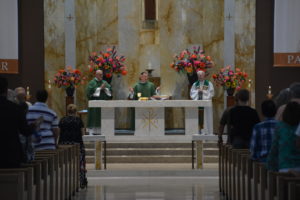Presentation of the Pope’s Message for the World Day of Social Communications
By VISarchive 02
Vatican City, 22 January 2016 (VIS) – This morning the a press conference was held to present the Holy Father’s Message for the fiftieth World Day of Social Communications. The panel was composed of Msgr. Dario Vigano, prefect of the Secretariat for Communication, Paolo Ruffini, director of TV2000, and Marinella Perroni of the Pontifical Athenaeum of St. Anselm, Rome.
The prefect mentioned that this World Day of Social Communications, which the Church celebrates on May 8, is the fiftieth in chronological order: an important fact that relates to Vatican Council II, which fifty years ago issued the Decree on the tools of social communication, “Inter mirifica”. It is also the only World Day established by the Council, and on this occasion it is also situated in the context of the great Extraordinary Jubilee of Mercy, to which the theme of the Day refers directly. Finally, it will be the first World Day of Social Communications held following the creation by the Holy Father of the Secretariat for Communications.
Following this preamble, Msgr. Vigano emphasised that mercy is the distinctive feature of the Church’s way of acting and of being. The relationship between the Church and mercy is not an extrinsic one, or indeed accidental … but rather intrinsic, constitutive, part of the very identity of the Church. The experience of the Pentecost is the beginning of the historic experience of the Church. The Church carries the memory of Jesus and therefore cannot interpret the words of His announcement other than in relation to mercy. They are works awaiting by those who think they are far from the God of mercy of Whom we often have a distorted image, such as that of God as a ruthless judge unable to engage with the limits of suffering. … For the men and women of today, for Jesus’ Church, these are the words to offer as an antidote to the harsh words of precepts pronounced by those who make accusations of prevailing relativism and the irrevocability of values. .. The Church called to participate in the messianic mission must know how to live in a true and authentic humanity. She must learn from Jesus how to express mercy in words of hope and life and in engaging gestures, letting us be touched by human experience and knowing, as Pope Francis often reminds us, how to touch the flesh of the least among us”.
The second point was the relationship between silence and listening. Msgr. Vigano cited the Swiss philosopher Max Picard, who explained that contemporary man has become an appendix to noise, atrophying in a context of words shouted instead of spoken, that reduce to a minimum our capacity to listen and cause a lack of attention. “Listening is a necessary act for the development of communication and it requires above all silence, an indispensable condition for receiving each word pronounced and for understanding its meaning. … We communicate only to the extent that we are are the same time listeners, and Pope Francis’ attention to this dichotomy is constant”. Pope Benedict XVI too paid great attention to this issue, when in the Message for the 2012 World Day of Social Communications he wrote that when messages and information are abundant, silence becomes essential to enable us to distinguish what is important from what is insignificant and secondary”.
The prefect concluded by quoting Dietrich Bonhoeffer, who wrote that the merciful “have an irresistible love for the down-trodden, the sick, the wretched, the wronged, the outcast and all who are tortured with anxiety. They go out and seek all who are enmeshed in the toils of sin and guilt. No distress is too great, no sin too appalling for their pity”. “It is the blessing of mercy that the Church is called to live, first and foremost in her relationships as the Christian community is not an elite group, nor is it made up of the perfect. St. Paul … invites us all to recognise the starting point of Christian and ecclesial life, which is God’s love and, by His grace, participation in His holiness”.
Finally, Msgr. Vigano returned to the theme of silence: “From this Gehenna of noise that is our daily life, from this wind tunnel of gossip, and chatter there arises spontaneously a nostalgia for silence, the wish to mute words of manipulation, to discover the words of silence. Contemporary man, almost without realising it, is calling out with Verlaine, give me silence, and the love of mystery.
The director of TV2000, Paolo Ruffini, spoke about the need for television able to look upon the world with the eyes of mercy, without being afraid of being rooted in reality. “It must not be closed up in its own studies. … It chooses closeness as a criterion for understanding, for surprising itself and for surprising, for acting, for choosing. … It draws near to people in flesh and blood in the real world, not in the virtual one … and is able to communicate reality without surrendering to stereotypes, or to the vicious circles of condemnation and vengeance which, as the Pope writes, continue to ensnare us”.
Source:: Vatican Information Service
Categories
From the Desk of Fr. JohnSs. Peter & Paul NewsU.S. Conf. of Catholic BishopsVatican Information ServiceWhat's HappeningUpcoming Events



